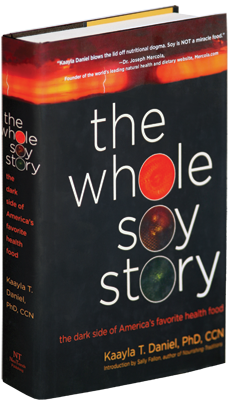Kaayla Daniel, also known as the Naughty Nutritionist, talks to me this week about how to recover from soy. Yes, I said recover, because soy is not a health food, but damages our health in many ways. We’re also going to talk about her new book about bone broths called Nourishing Broth, on which she is collaborating with Sally Fallon Morell.
Transcript
Click here to view the full transcript for #39 Recovering from Soy with Kaayla Daniel.
Soy is not a health food. It should be avoided completely or eaten only on rare occasions and in fermented forms. The soybean is now being linked to breast cancer, thyroid disease, menstrual and fertility issues, as well as severe allergies, compromised immunity and brain damage.
SOY DANGERS SUMMARIZED
- High levels of phytic acid in soy reduce assimilation of calcium, magnesium, copper, iron and zinc. Phytic acid in soy is not neutralized by ordinary preparation methods such as soaking, sprouting and long, slow cooking. High phytate diets have caused growth problems in children.
- Trypsin inhibitors in soy interfere with protein digestion and may cause pancreatic disorders. In test animals, soy containing trypsin inhibitors caused stunted growth.
- Soy phytoestrogens disrupt endocrine function and have the potential to cause infertility and to promote breast cancer in women.
- Soy phytoestrogens are potent antithyroid agents that cause hypothyroidism and may cause thyroid cancer. In infants, consumption of soy formula has been linked to autoimmune thyroid disease.
- Vitamin B12 analogs in soy are not absorbed and actually increase the body’s requirement for B12.
- Soy foods increase the body’s requirement for vitamin D.
- Soy infant formula can cause lifelong allergies, autoimmune thyroid disease, asthma, and attention deficit disorder.
- Fragile proteins are deformed during high temperature processing to make soy protein isolate and textured vegetable protein, making them very difficult to digest.
- Processing of soy protein results in the formation of toxic lysinoalanine and highly carcinogenic nitrosamines.
- Free glutamic acid or MSG, a potent neurotoxin, is formed during soy food processing and additional amounts are added to many soy foods.
- Soy foods contain high levels of aluminum that is toxic to the nervous system and the kidneys.
Soy HEALTH PROBLEMS SUMMARIZED
- Thyroid problems: including weight gain, lethargy, depression, fatigue, hair loss, and loss of libido
- Premature puberty
- Weight gain
- Estrogen Dominance Syndrome
- Developmental delays and problems in babies, children, and adolescents
- Asthma
- Causes and exacerbates endometriosis
- Cancer
- Brain damage, reducing production of new brain cells
- Dementia
- Reproductive disorders
- Reduced Fertility
- Kidney stones
- Weakened immune system
- Severe food allergies
- Man boobs and reduced sex drive in men
About Kaayla Daniel
 Kaayla T. Daniel is known as The Naughty Nutritionist. Her writing and blog get a bit naughty at times! She earned her PhD in Nutritional Sciences and is board certified as a clinical nutritionist (CCN).
Kaayla T. Daniel is known as The Naughty Nutritionist. Her writing and blog get a bit naughty at times! She earned her PhD in Nutritional Sciences and is board certified as a clinical nutritionist (CCN).
She serves as Vice President of the Weston A. Price Foundation and is a member of the Board of Directors of the Farm-to-Consumer Legal Defense Fund. In 2005, Dr. Daniel received the Weston A. Price Foundation’s Integrity in Science Award.
Works by Kaayla Daniel
 Dr. Daniel’s book The Whole Soy Story: The Dark Side of America ‘s Favorite Health Food, has been endorsed by leading health experts, including Drs. Russell Blaylock, Larry Dossey, Nicholas Gonzalez, Joseph Mercola, Kilmer McCully, Doris J. Rapp and Jonathan Wright.
Dr. Daniel’s book The Whole Soy Story: The Dark Side of America ‘s Favorite Health Food, has been endorsed by leading health experts, including Drs. Russell Blaylock, Larry Dossey, Nicholas Gonzalez, Joseph Mercola, Kilmer McCully, Doris J. Rapp and Jonathan Wright.
The Whole Soy Story is a groundbreaking expose that tells the truth about soy that scientists know but that the soy industry has tried to suppress. Soy is not a health food, does not prevent disease and has not even been proven safe. Epidemiological, clinical and laboratory studies link soy to malnutrition, digestive problems, thyroid dysfunction, cognitive decline, reproductive disorders, even heart disease and cancer.










